Share Your Stories
YEAR OF NEWS :

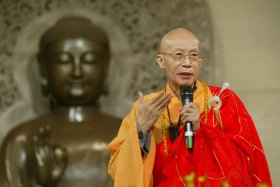
Wednesday, December 24, 2014
The Heart Sutra teaches that suffering comes from ignorance, attachment to self, and confusion caused by afflictions; it also teaches us how to live with purpose, to ultimately fulfill the four great vows and to cultivate a non-abiding mind. But we are stubborn and refuse to give up our afflictions easily, for ignorance and self-attachment are at the roots our perceived existence. Nevertheless, it is through our will and our vows, the wellsprings of action, that we arouse the bodhi-mind , and begin the process of enlightenment. This willingness is crucial, because it is not easy to change our old ways, however destructive or comforting they may be. But the choice, as always, is ours. By following the bodhisattva path to its end, we will ultimately exhaust all ignorance, cross the ocean of suffering, and reach anuttara-samyak-sambodhi. This is the far-reaching and profound message of the Heart Sutra.

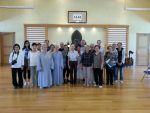
The Senior Group in Marpole and Oakridge Community Centre always look out for opportunities to broaden their interest and learn from different cultures. We were fortunate that Venerable Chang Wu of Dharma Drum Vancouver Center has agreed our group’s visit and arranged a day program for us on August 5.
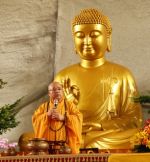
In view of a series of recent calamities, the Abbot President of DDM, Ven. Guo Dong, specifically encouraged the public to face impermanent situations with a peaceful mind, which is also the most important fortress for us. Only with calmness and steadiness, we can prevent ourselves from getting into panic.
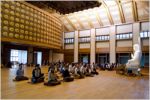
Dharma Drum Mountain frequently hosts week-long meditation retreats in Chinese, and occasionally hosts similar retreats in English. I am grateful to have benefited from the special opportunity to participate in a seven-day retreat at Dharma Drum Mountain this July.
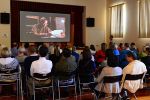
“Wow, this place is so clean!” A lady said as she walked past. A smile came over my face at the comment and immediately thought of all the hard work volunteers put in to make sure our new center was clean and inviting. It was Sunday, the 18th of May and DDMBASF was having its first open house in our new Fremont center. It was Open House- Open Arms- for the local community.
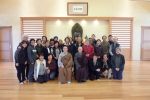
To experience true relaxation and freedom of body and mind, I entered the Chan hall of Dharma Drum Vancouver Center (DDVC) on the evening of April 18 for a fundamental seven-day retreat. Even though having participated in meditation retreats of both silent illumination and huatou practices, what I was seeking in this retreat is the true relaxation and calm, as I know that Chan meditation practice guided by Ven. Chang Wu, Chief Director of DDVC, will help the retreatants relax their body and mind and the bliss of meditation.
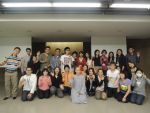
Although there are only several hundred words in the Heart Sutra, whenever I am confused or feeling helpless, transcribing the sutra helps me settle my mind and complete my tasks at hand. Hence I wanted to further understand the Heart Sutra. It just happened that there was a class about this which has further helped me my understanding of this classic sutra.
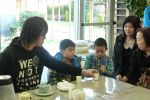
(1) In our busy daily lives, it can be difficult to find the time to slow down, even for five minutes. Every day breezes by and we do not pay attention to all the beauties around us. On Sunday February 2, 2014 I attended the tea Chan for the Lunar New Year. I also had the pleasure to perform during this event, along with many others. As usual, I was feeling nervous and shaky, as most people feel right before a big event.
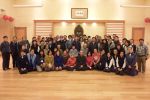
In a foggy morning on January 18th, 2014, participants one after the other arrived at the Dharma Drum Mountain Vancouver Center to attend the one-day Chan in Daily Life workshop guided by Abbot Venerable Guo Xing.
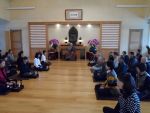
At the beginning of 2014, Dharma Drum Mountain Vancouver Center invited Venerable Guo Xing, Abbot of Dharma Drum Retreat Center, to lead a 2-day non-residential retreat. What a wonderful blessing to start the new year. In this retreat, we applied the method of “reciting the Buddha’s name.” This method was first introduced to us last year and was greatly appreciated by the participants.This year, we were fortunate to have Ven. Guo Xing back and lead another retreat with this simple but effective Chan practice method. The Venerable said that our six sense organs (eye, ear, nose, tongue, body, thoughts) are like six animals that constantly want to run out and to contact the external six sense fields (form, sound, smell, taste, touch, and thought).The way to keep the animals inside is to tie them with a rope. Likewise, the method is like the rope to keep our six sense organs still, and in this two-day retreat the method of reciting the Buddha’s name is the rope. Recitation of the Buddha’s name is not only a pure land method, but also a Chan meditation practice.

PAGE :
1
2
3

|